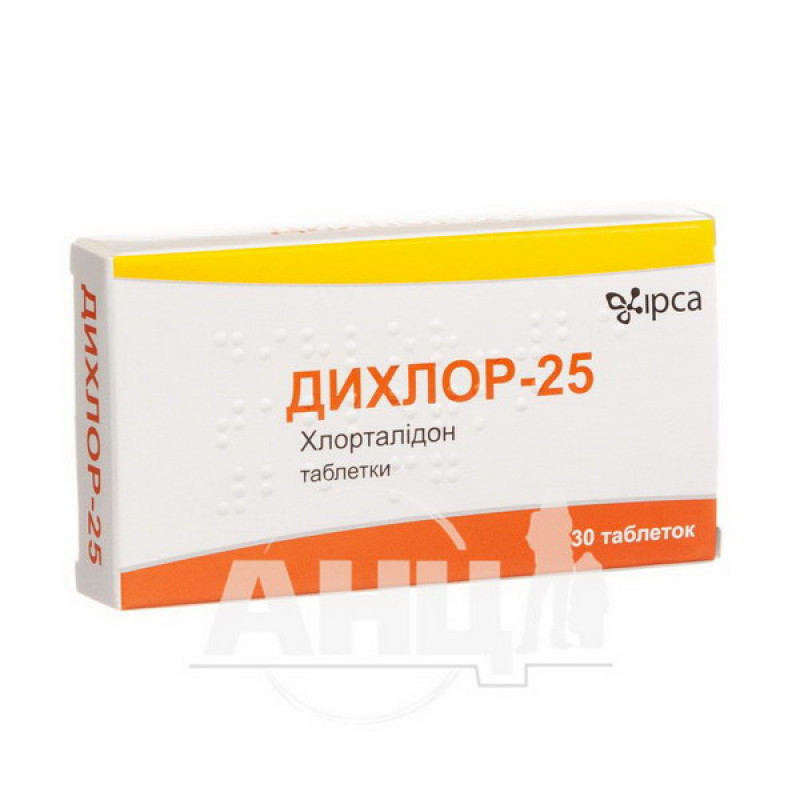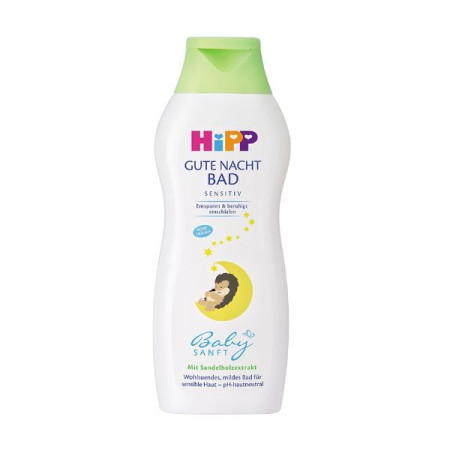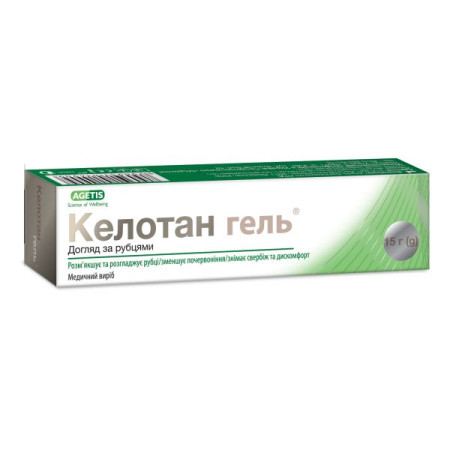Dichlor-25 tablets blister No. 30

Dichloro-25 tablets are indicated for:
Treatment of arterial hypertension, essential or nephrogenic, or isolated systolic hypertension. Treatment of stable, chronic heart failure of mild and moderate severity (functional class II or III according to the NYHA classification). Treatment of edema.Composition
Active ingredient: chlortalidone;
1 tablet contains 25 mg or 50 mg of chlorthalidone;
Excipients: microcrystalline cellulose, corn starch, quinoline yellow (E104), sodium starch, colloidal silicon dioxide, stearic acid.
Contraindication
Hypersensitivity to chlorthalidone or to other sulfonamide-derived drugs. Anuria. Severe hepatic or renal insufficiency (creatinine clearance <30 ml/min). Refractory hypokalemia, hypercalcemia and hyponatremia. Symptomatic hyperuricemia (gout or history of uric acid stones). Hypertension during pregnancy. Untreated Addison's disease. Concomitant lithium therapy. Children's age. Pregnancy and breastfeeding. Intoxication with cardiac glycosides.Method of application
Arterial hypertension.
Monotherapy. For the treatment of hypertension, the recommended starting dose of chlorthalidone for adults is 25 mg per day. This is sufficient to produce a maximal hypotensive effect in most patients. If blood pressure is not reduced at a dose of 25 mg/day, it can be increased to 50 mg/day. If additional antihypertensive therapy is used, an increase in the dose to 50 mg increases metabolic complications and rarely has a therapeutic effect.
Combination therapy. If combination therapy is required for the treatment of hypertension, the dosage may be adjusted, primarily when using each drug separately.
Stable chronic heart failure (functional class II or III according to the NYHA classification).
The recommended initial dose is 25 to 50 mg/day, in severe cases the dose can be increased to 100 - 200 mg/day. The usual maintenance dose is the most effective dose, for example 25 to 50 mg daily or every other day. If the response is insufficient, digitalis preparations and / or ACE inhibitors can be added. Edema.
The minimum effective dose should be determined by titration and should be taken only for a limited period. It is not recommended to exceed a dose of 50 mg per day. Elderly patients and patients with impaired renal function. The minimum effective dose of chlorthalidone is recommended for patients with mild renal insufficiency and in elderly patients. Contraindicated in patients with creatinine clearance <30 ml/min.
Elderly patients are more slowly eliminated from the body than young healthy adults, despite similar absorption. Therefore, the usual dose should be reduced. Elderly patients should be carefully monitored during treatment with chlorthalidone.
Application features
Pregnant women
Contraindicated.
Children
Not applicable.
Drivers
You should refrain from driving and performing work that requires increased attention.
Overdose
Symptoms of acute overdose include nausea, weakness, drowsiness, hypovolemia, hypotension, dizziness, and electrolyte imbalance associated with cardiac arrhythmias and muscle spasms.
There is no specific antidote. To reduce absorption, gastric lavage, induce vomiting, or administer activated charcoal. Blood pressure and fluid and electrolyte balance should be monitored and appropriate corrective measures taken.
Side effects
Gastrointestinal tract: anorexia, nausea, vomiting, cramps, diarrhea, constipation, jaundice, pancreatitis. Nervous system: dizziness, paresthesia, headache, xanthopsia. Blood: leukopenia, agranulocytosis, thrombocytopenia, aplastic anemia, eosinophilia. Skin: purpura, photosensitivity, rash, urticaria, necrotizing angiitis vasculitis (cutaneous vasculitis), Lyell's syndrome (toxic epidermal necrolysis). Cardiovascular system: orthostatic hypotension, which may be exacerbated by alcohol, barbiturates or drugs. Cardiac arrhythmias may occur very rarely. Digestive system: hypokalemia, hypoparathyroidism, hypomagnesemia, hyperglycemia, hyperuricemia, increased blood lipid levels, glycosuria and hypochloremic alkalosis.Interaction
Patients should be warned that alcohol consumption may cause dizziness.
Thiazides may potentiate bone marrow suppression caused by cancer chemotherapy (e.g. neutropenia).
Storage conditions
Store in the original packaging at a temperature not exceeding 25 °C.
Keep out of reach of children.
Shelf life - 2 years.
There are no reviews for this product.
There are no reviews for this product, be the first to leave your review.
No questions about this product, be the first and ask your question.












